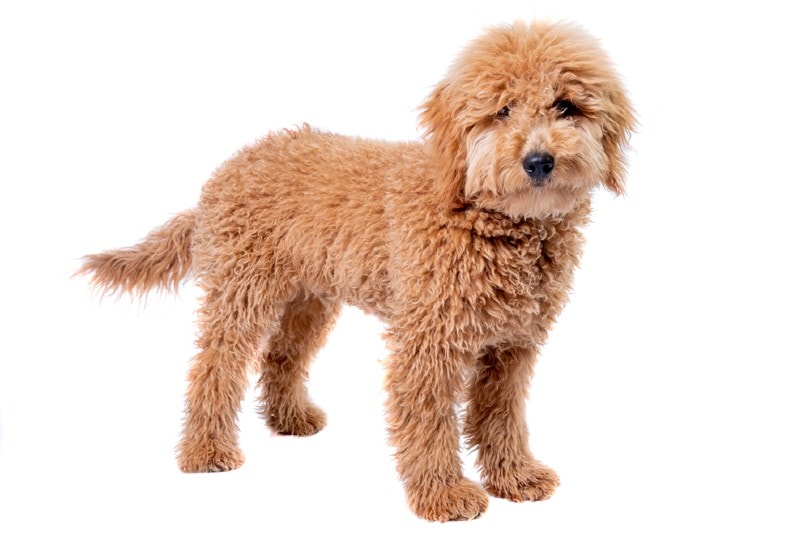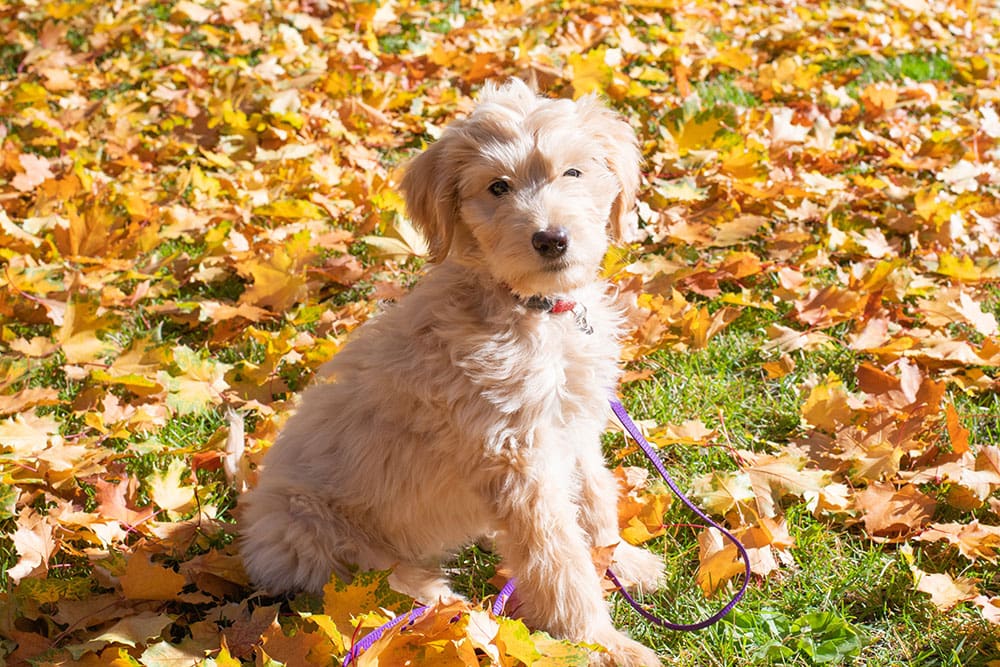
Click Below to Skip Ahead
The Goldendoodle is a hybrid breed, a cross between the Golden Retriever and Standard Poodle. These designer dogs were likely first bred as far back as the late 1960s but gained traction and got their official name in the 1990s, when Poodle mixes first began to become popular. They have been gaining in popularity ever since, in large part due to the traits that they inherit from their hugely popular parent breeds, combining the best parts of Golden Retrievers and Poodles into one adorable package.
Breed Overview
Height:
20 – 24 inches
Weight:
50 – 90 pounds
Lifespan:
10 – 15 years
Colors:
Golden brown, tan, black
Suitable for:
Families, couples, first-time dog owners
Temperament:
Intelligent, loyal, affectionate, playful, energetic, social
They are such social, loyal, and dependable dogs, they have been popular as family companions and have been widely used in search and rescue, therapy, and as guide dogs for the blind too. Indeed, you’d be hard-pressed to find a more versatile designer breed, and this dog can slot seamlessly into almost any job that they’re given, except perhaps, as guard dogs — they are just too friendly for that!
In this guide, we go in-depth on the personality and care requirements of these adorable dogs, so you can decide whether the Goldendoodle is the right fit for you. Let’s get started!
Goldendoodle Characteristics
Goldendoodle Puppies

The Goldendoodle can be high energy at times, especially in the first couple years of their life. This energy needs an outlet, and you’ll need to dedicate a great deal of time every day to training and exercise to keep them healthy and happy. Bear in mind that you’ll need to exercise and train them for at least 2-3 hours every day — the more, the better.
Since these social animals do not enjoy being left at home alone, they’ll need a ton of attention. If you’re away from home for most of the day, the Goldendoodle is unfortunately not the right breed for you.

Temperament & Intelligence of the Goldendoodle
The Goldendoodle is, above all, an intelligent and social dog and loves nothing more than being around their owners, although they get along great with almost everyone. They have inherited this calm, friendly, and docile nature from their Golden Retriever heritage, and they are rarely aggressive or territorial. Of course, this friendly nature comes with a minor downside: They are not the world’s greatest guard dogs! They are not known for barking much, even if there is a stranger at the door, making them ideal pets if you prefer peace and quiet.
They are devoted family pets that love to be included in every activity and thus will suffer from separation anxiety if left alone for long periods. Goldendoodles form powerful bonds with their owners and need a ton of interaction and attention from them, so it’s important to involve them in your daily activities as much as possible.
Are These Dogs Good for Families? 👪

The is an ideal family dog. They are social, friendly, and loyal as they come and are the picture-perfect family dog. They are generally gentle and patient with children and will happily spend hours playing with them in the backyard and are not so excitable that they’ll knock small children over.
Does This Breed Get Along With Other Pets?
The Goldendoodle’s friendly and social nature extends to other pets too, and they generally make fast friends with other pets in the home, even the cat! Of course, early socialization is still essential because they can become rather attached to their owners, which may be problematic occasionally. They also do not have much of a prey drive, so even other small pets in your home are usually safe with a Goldendoodle.
Things to Know When Owning a Goldendoodle
Goldendoodles are an ideal choice for first-time dog owners because they are such friendly and easy-to-care-for pooches, but they still have essential care requirements that you’ll need to become familiar with before bringing one home.
Food & Diet Requirements 🦴
Goldendoodles are fairly high-energy dogs and thus, need a diet that can provide for their energy needs. This is especially true during the first year because they are growing rapidly, and they’ll need food tailored for growing pups. The food that you give your Goldendoodle should be of the best quality that you can afford, free from filler ingredients like soy and corn, with an animal-based protein as the first listed ingredient or at least among the top three. They’ll need 1–4 cups of high-quality dry food per day (depending on their size), divided into two meals to reduce the chance of gastric torsion and bloat.
We recommend giving your pup lean meats occasionally as a healthy treat and for variety, and as with all dogs, they need to be provided with clean, fresh water at all times.
Exercise 🐕
Goldendoodles need at least 1–2 hours of exercise per day, but even more is better, if possible. They will love their daily walk followed by a play session in the backyard, and like both Poodles and Golden Retrievers, Goldendoodles love to swim, a fun activity that can also give them beneficial exercise. They are playful dogs that will adore games of frisbee or fetch in the backyard, and this will also provide them with mental stimulation, an important aspect for such intelligent animals. Puzzle toys are other valuable accessories for these dogs, and these will go a long way in helping prevent boredom.
Of course, Goldendoodles are social animals, so they will enjoy walks with other dogs or social play sessions in the dog park too. They are not massive dogs but still are not suited for apartment living because they need a large backyard to play in.
Training 🎾
Goldendoodles are highly intelligent and eager to please, and thus, they are generally a breeze to train. In fact, these dogs are often used as therapy or service dogs due to their ease of training and friendly nature. This makes them ideal for novice dog owners because they are generally ready and willing for their daily training sessions!
We highly recommend positive reinforcement training methods, as these sensitive dogs will not respond well to harsh training methods. This will ensure a happier dog overall and forge a close bond of trust between you and your Goldendoodle. An often overlooked aspect of training is early socialization. Making sure your puppy is exposed to other dogs regularly early will help training exponentially in the future. Also, keep training and socialization sessions short and consistent, as this routine will also help during training.
Grooming ✂️
Goldendoodles may have straight, wavy, or curly coats, depending on the genes that they inherited from their parents, so their grooming requirements will be slightly different for each coat type. Straight coats will be easiest to groom and won’t require much brushing, but the other two coat types will need daily brushing to prevent knotting and matting. No matter the coat type, these dogs are fairly low-shedding, so keeping them well-groomed is simple.
Other than that, regular teeth brushing and nail clipping every 6–8 weeks are all that’s needed.
Health and Conditions 🏥
Goldendoodles are known to be healthy dogs overall and benefit from hybrid vigor, the health benefit of mixing two purebred dogs, although they are still susceptible to a few of the genetic health issues that their parent breeds suffer from.
Both Golden Retrievers and Poodles are known to suffer from hip and elbow dysplasia occasionally, as well as eye problems, such as progressive retinal atrophy. Your Goldendoodle will also have the droopy, low-hanging ears of their parent breeds, so it’s important to keep the inside of their ears dry at all times and check them regularly for any signs of infection.
Male vs Female
While there may be advantages to owning a male or female Goldendoodle depending on your unique situation, your dog’s personality is far more influenced by their upbringing and environment than their sex. If you already have dogs at home, same-sex pairings may cause territorial behavior at times, although Goldendoodles are so easygoing that this is rarely an issue. Also, neutering males and spaying females will further reduce any hormonal differences. These procedures have also been shown to have health benefits and will prevent males from wandering and stop unwanted pregnancies in females.
3 Little-Known Facts About the Goldendoodle
1. They are extremely intelligent
The Poodle and Golden Retriever are recognized as the second and fourth most intelligent dog species in the world, respectively. This assessment comes from the famous book, “The Intelligence of Dogs” by neuropsychologist Stanley Coren. Coren assessed over 100 dog breeds, and the top-ranked dogs could learn commands in five repetitions or less and obey them 95% of the time or better. With parent breeds that are ranked among the top five on the planet, you can be sure that your Goldendoodle will be super smart too!
2. They are highly athletic
While Goldendoodles are certainly cuddly and love to laze on the sofa with their owners, these dogs are highly athletic and agile, too. They love long walks and hikes and have a ton of energy. Both their parent breeds have a long history of working out in the field with humans for hours on end, and this high energy and stamina will most likely be passed down to Goldendoodles.
3. They can vary in size
There is only one size of Golden Retriever, and they are usually around 21–24 inches high, but there are three distinct sizes of Poodles: the Toy, Standard, and Miniature. While most Goldendoodles are bred using Standard Poodles, some are occasionally bred with Miniature Poodles, and this can result in varying Goldendoodle sizes, some of which stand only 13–17 inches high.
Final Thoughts
The Goldendoodle is an ideal family dog and perfect for first-time dog owners because they are social, intelligent, easy to train, and highly affectionate. If you are looking for a gentle yet active and playful family dog, the Goldendoodle is a wonderful pooch that is the epitome of a family dog. Just don’t expect them to be a good guard dog—they are more likely to give any intruders a warm greeting than chase them away!
There is so much to love about the Goldendoodle, and they are adaptable dogs that can slot perfectly into almost any living situation. You’d be hard-pressed to find a more friendly, affectionate, and playful dog than the gorgeous Goldendoodle!
You may also want to read:
- How Long Do Goldendoodles Live? (Average Lifespan Data & Facts)
- 10 Best Brushes for Goldendoodles – Reviews & Top Picks
- Are Goldendoodles Hypoallergenic Dogs? An Allergy Sufferers Guide To Dogs
Featured Image Credit: Matthew Yoder, Shutterstock









